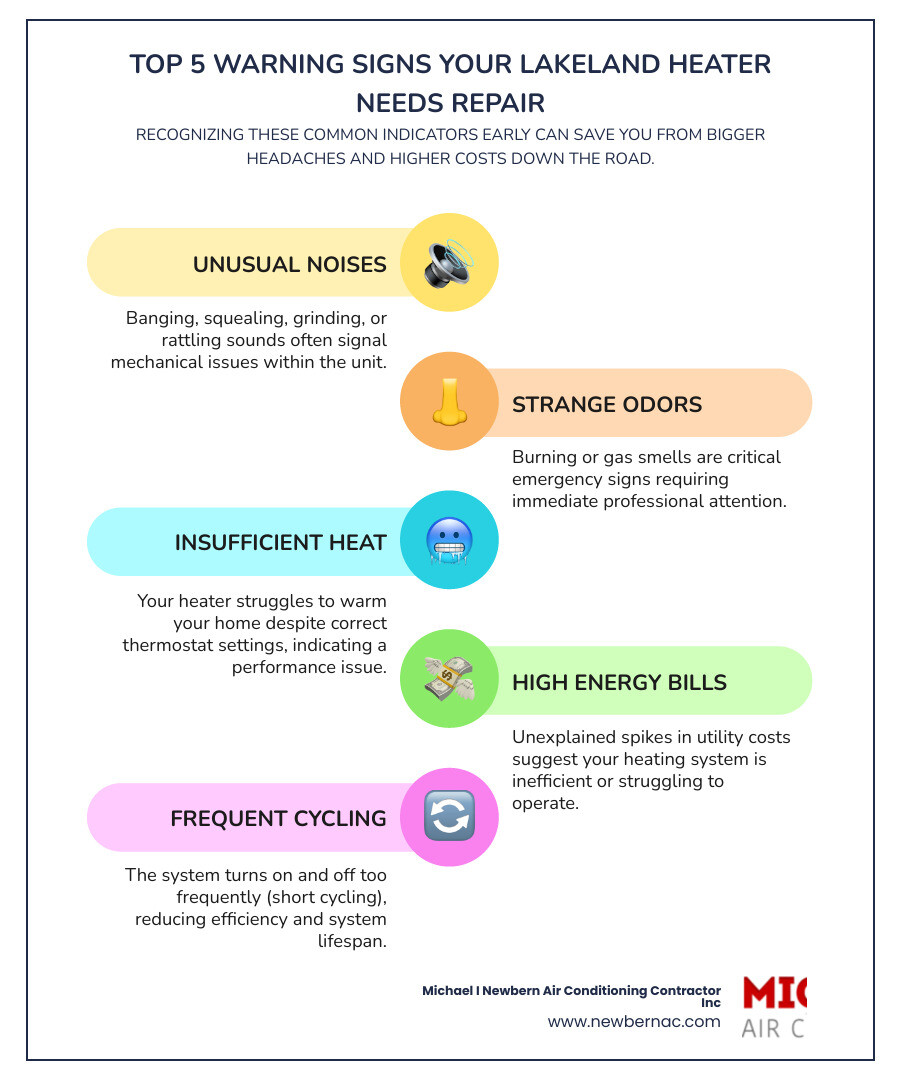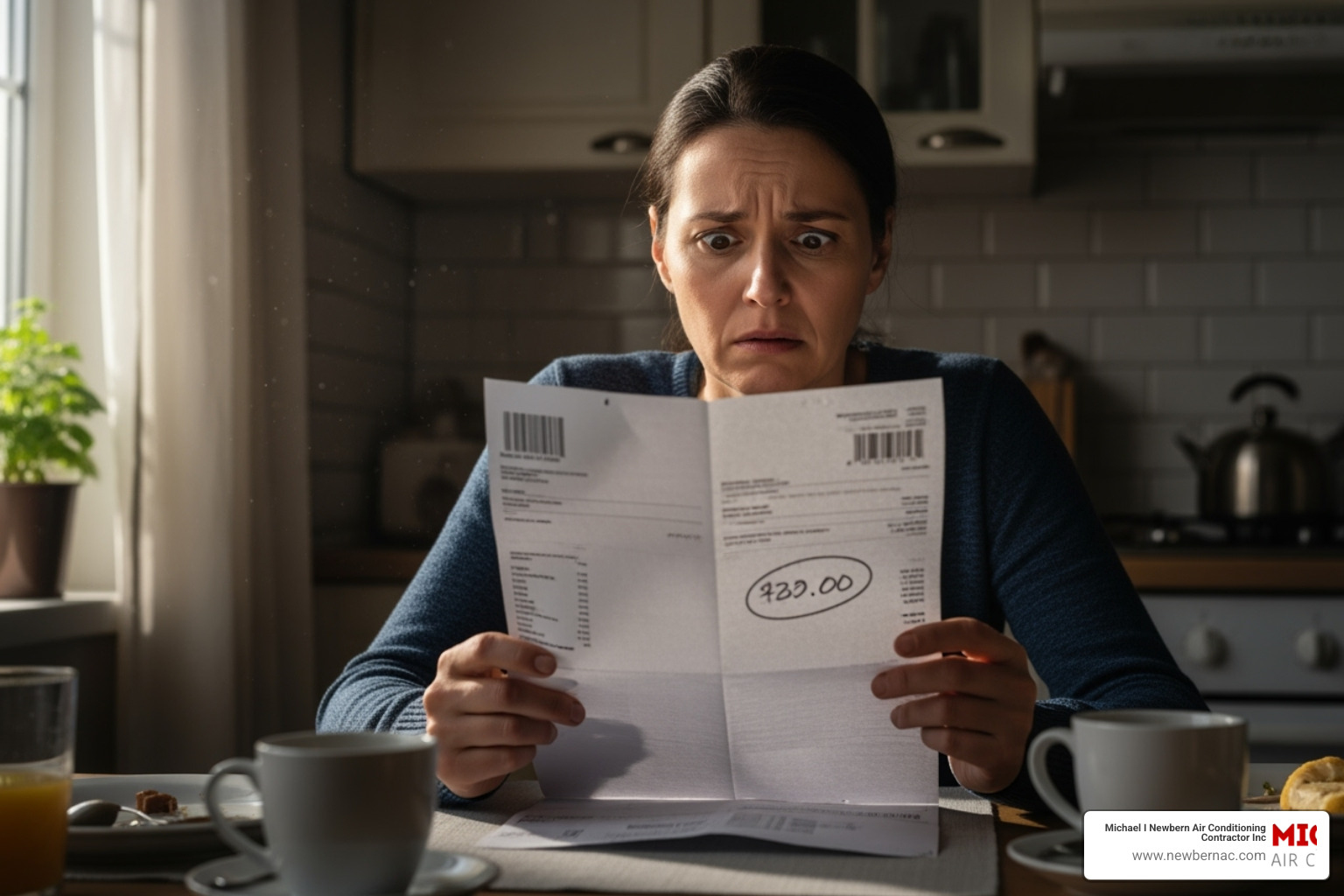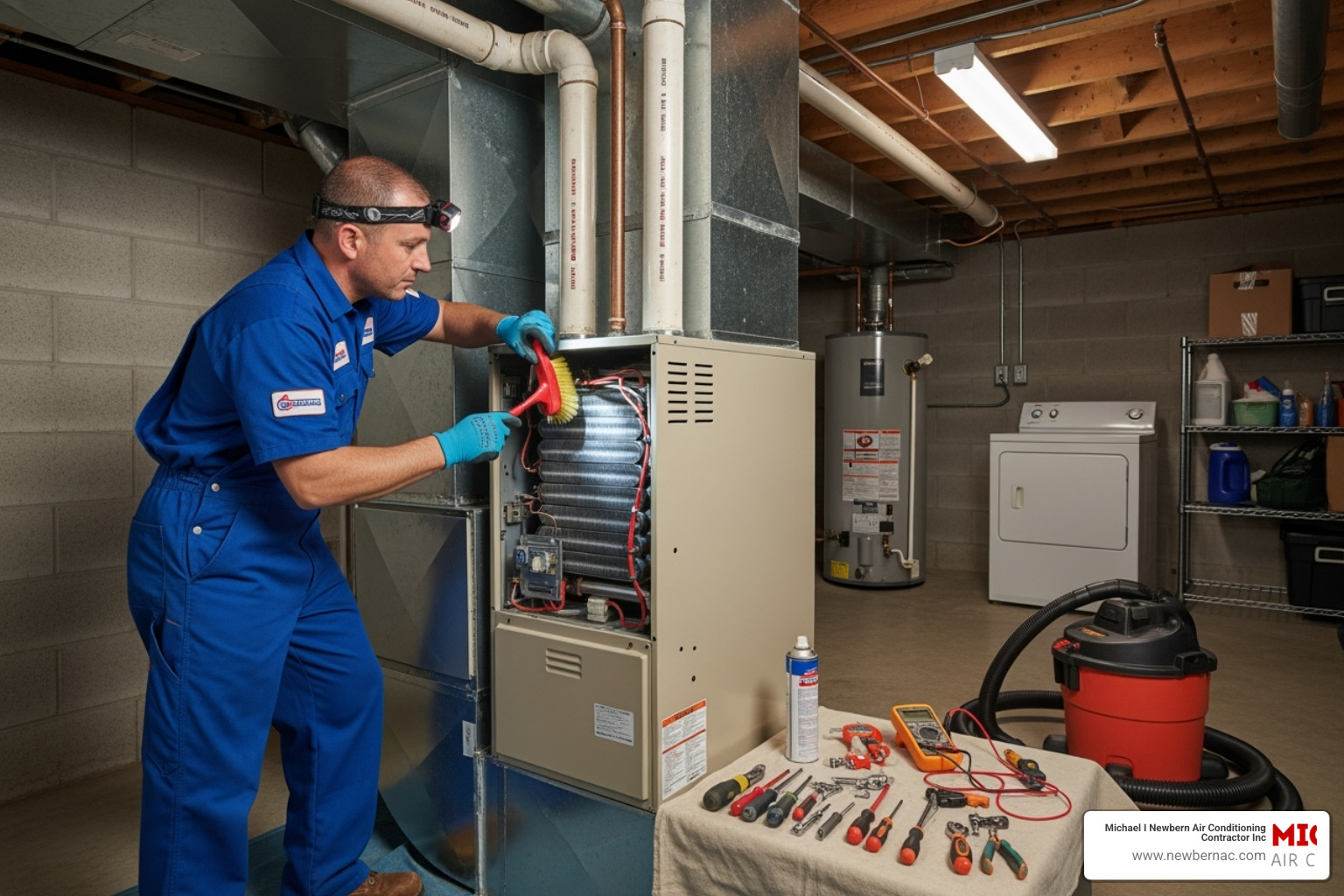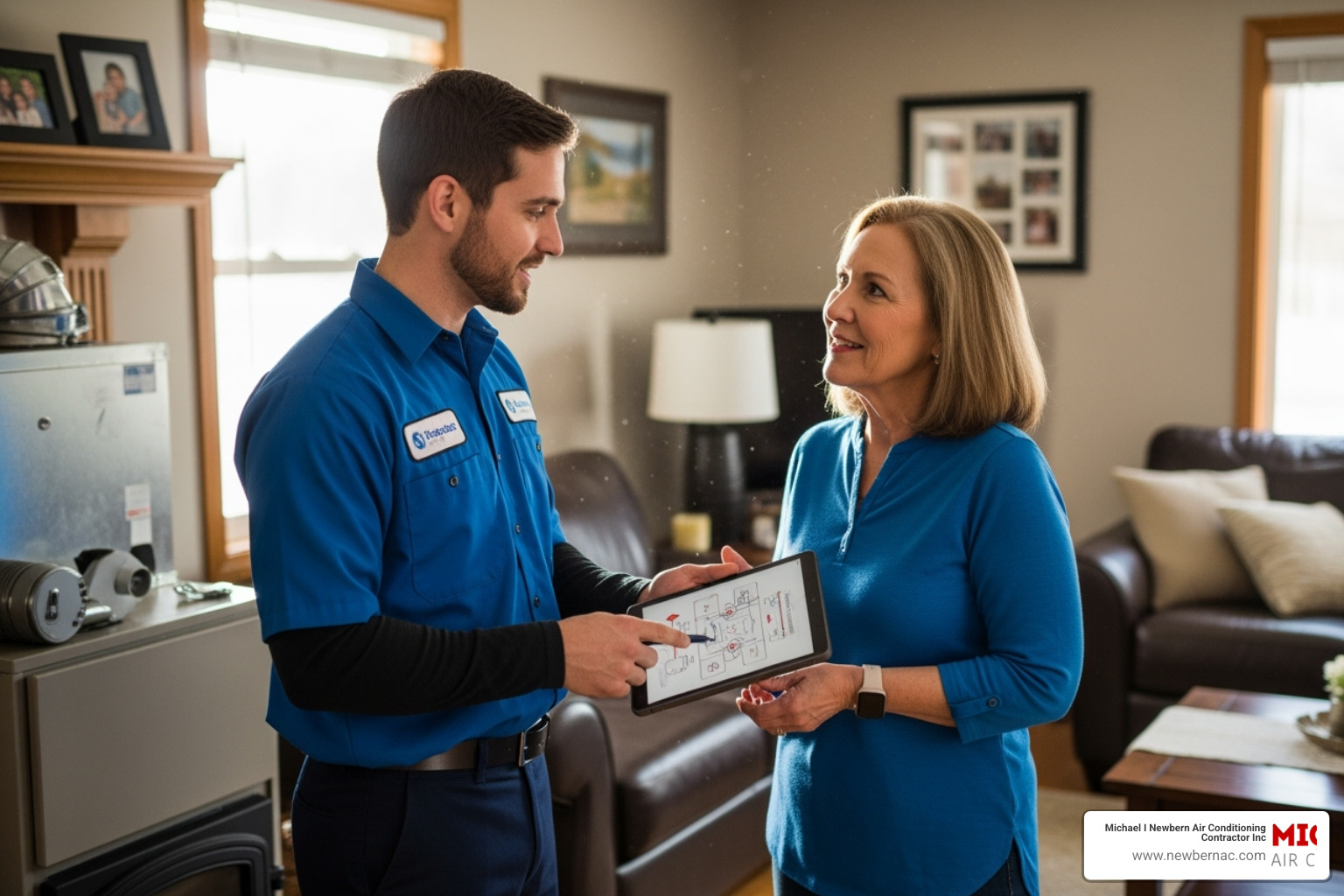Why Reliable Heating Systems Matter in Central Florida
Heating repair Lakeland services are essential when Central Florida’s winter temperatures drop, making a functioning heating system crucial for home comfort. Even in our warm climate, those cooler months can make homes uncomfortable without reliable heating.
Quick answers for Lakeland heating repair needs:
- Strange noises or smells – Call a professional immediately
- Insufficient heat or frequent cycling – Check filters first, then contact a technician
- High energy bills – May indicate system inefficiency requiring repair
- Gas odors or burning smells – Emergency situation, turn off system and call now
- System over 15 years old – Consider professional inspection for repair vs. replacement
The average annual cost for heating and cooling a Florida home ranges from $1,500 to $2,500, with heating often representing a significant portion during cooler months. A well-maintained heating system can operate up to 15% more efficiently than one that hasn’t been serviced regularly.
Lakeland’s climate presents unique challenges. Heating units sit unused for months, then must perform reliably when temperatures drop. This usage pattern can cause issues that require professional diagnosis and repair.
Regular maintenance can reduce the likelihood of costly emergency repairs by up to 90%. Most residential furnaces have a lifespan of 15-20 years, meaning many Lakeland homes may be approaching the age where repairs become more frequent.
Telltale Signs Your Lakeland Heater Needs Professional Repair
Your heating system often provides warning signs before it breaks down completely. Recognizing these signs early can save you from cold nights and costly emergency repairs.
Unusual noises are a common first sign of trouble. A healthy system hums quietly. If you hear banging, squealing, grinding, or rattling, a component may be loose or a motor failing. These noises tend to worsen over time and require attention.
Strange smells can indicate what’s happening inside your system. A light dusty smell when first turning on your heater is normal. However, persistent burning odors, metallic smells, or a rotten egg smell require immediate attention. A sulfur smell is particularly urgent and means you should call for heating repair Lakeland services right away.
Insufficient heat is a clear sign of a problem. If your system is running but your home isn’t warming up, or some rooms are colder than others, your heater is struggling. This could be a simple clogged filter or a more significant issue with heating elements or ductwork.
High energy bills that appear suddenly are another red flag. If your usage habits haven’t changed but your bills have spiked, your system is likely running inefficiently and needs to be inspected.
Frequent cycling—when your heater turns on and off in short, repeated bursts—is a sign of a problem. This “short cycling” puts extra strain on your system while failing to heat your home effectively.
Poor air quality when the heater is on can also signal a problem. If you notice more dust or the air feels stuffy, your system may need professional cleaning or service.
Emergency Symptoms: When to Call for Immediate Heating Repair in Lakeland
Some heating problems are emergencies that require immediate action. If you notice the following signs, turn off your system and call for professional heating repair Lakeland services immediately.
Gas or fuel odors, especially a rotten egg smell, could indicate a natural gas leak. Evacuate your home immediately and call the gas company from a safe distance. Do not attempt to troubleshoot this yourself.
Carbon monoxide detector alarms must always be taken seriously. Carbon monoxide is an invisible, odorless, and deadly gas. If your alarm sounds, get everyone out of the house and call 911.
Electrical burning smells, like melting plastic, signal a potential fire hazard from overheating electrical components. Turn off power to your heating unit at the circuit breaker immediately and call for service.
Loud, persistent noises that sound violent or mechanical can indicate a critical component is about to fail. While some noises are minor, extremely loud banging or grinding requires immediate attention.
No heat during a cold snap can be an emergency, especially for vulnerable family members like the elderly or young children. When temperatures drop into the 40s or 50s, maintaining a safe indoor temperature is crucial for health and comfort.
The Value of Proactive Care: Maintenance and Winter Prep
For Lakeland homeowners, regular heating system maintenance is essential, especially since units sit idle during our long summers. Investing in proactive care prevents problems, improves efficiency, and offers significant rewards.
- Improved efficiency: A well-maintained system can be up to 15% more efficient, meaning it works smarter, not harder, to heat your home.
- Lower energy bills: This improved efficiency directly translates to savings. With the average Florida home spending $1,500 to $2,500 annually on heating and cooling, a 15% improvement adds up.
- Fewer breakdowns: Regular maintenance can reduce the chance of costly emergency repairs by up to 90%. Technicians can spot and fix small issues before they become major failures.
- Longer system lifespan: Most furnaces are designed to last 15-20 years, but only with proper care. Maintenance helps your system reach its full potential lifespan.
- Improved safety: Technicians check for gas leaks, ensure proper ventilation, and inspect electrical components to prevent hazards like carbon monoxide poisoning or fires.
Preparing Your Heating System for Lakeland’s Winter
Before winter arrives, a few simple DIY steps can prepare your heating system for the season:
- Change your air filters. This is the most important DIY task. A dirty filter restricts airflow, forcing your system to work harder. Check your filter monthly and replace it every 1-3 months.
- Clear vents and registers. Walk through your home and ensure that all vents are open and unobstructed by furniture, rugs, or curtains.
- Test your thermostat. Before you need it, switch your thermostat to “heat” and set the temperature higher to ensure the system turns on. If the screen is blank, try replacing the batteries.
While these steps are helpful, they don’t replace a professional tune-up. Our technicians perform a comprehensive inspection, cleaning internal components, checking electrical connections, and lubricating moving parts to ensure your system operates safely and efficiently.
Professional maintenance provides peace of mind by catching small issues before they become major problems. For comprehensive heating services and professional tune-ups, consider our Heating Service in Auburndale, FL.
Your Guide to Professional Heating Repair Lakeland Services
When you need heating repair Lakeland services, finding a trustworthy, skilled, and transparent professional is crucial. Understanding the basics of common systems, contractor qualifications, and repair costs will help you make an informed decision.
Common Heating Systems Serviced in the Lakeland Area
Central Florida homes use a variety of heating systems suited to our climate:
- Heat pumps are Lakeland’s workhorses. They cool in the summer and heat in the winter by reversing their operation. By moving heat instead of creating it, they are highly energy-efficient.
- Gas furnaces provide fast, consistent warmth by burning natural gas or propane to heat air that is then circulated through your home’s ductwork.
- Electric furnaces use electric heating elements instead of fuel. They are a reliable option for homes where natural gas is not available.
- Ductless mini-split systems are popular for home additions or for creating temperature zones. They allow you to control the temperature in individual rooms for precise comfort.
For more details on these systems, you can explore What are the 4 Main Types of Home Heating Systems?.
Choosing a Qualified Technician: What to Look For
When selecting a technician for your heating repair Lakeland needs, look for these qualifications:
- Licensed and insured: This is non-negotiable. A valid license (look for the CAC number in Florida) and proof of insurance protect you and the technician.
- Positive local reviews: Check sites like Google and the Better Business Bureau to see what your neighbors say about a company’s service.
- Local experience: A company familiar with Lakeland understands our climate and the common heating issues that arise here.
- NATE certification: This certification indicates a technician has proven their expertise through rigorous testing.
- Upfront pricing: A reputable company will provide a clear, written estimate before any work begins. Avoid contractors who are evasive about costs.
- A+ rating with the Better Business Bureau: This rating shows a company’s commitment to ethical business practices and customer satisfaction.
Understanding the Costs of Heating Repair in Lakeland
While every repair is different, understanding what influences the cost can help you budget for heating repair Lakeland services.
- Type of repair: A simple fix like a new thermostat is much less expensive than replacing a major component like a heat exchanger or compressor.
- System’s age: Older systems may require parts that are harder to find or more labor-intensive repairs. At a certain point, the cost of repairs may approach that of a new system.
- Parts and labor: Costs reflect the price of the necessary components and the time and skill required to perform the repair correctly.
- Ongoing energy costs: A poorly functioning system uses more energy, increasing your monthly utility bills. A repair can often pay for itself in energy savings.
Always request a detailed, written estimate before work starts. This ensures transparency and protects both you and the contractor.
Repair vs. Replacement: A Critical Decision for Your Home
Deciding whether to repair or replace your heating system is a critical choice for Lakeland homeowners. There’s no single right answer, but several key factors can guide your decision.
- System age: Most residential furnaces last 15-20 years. If your system is under 12 years old, a repair is often the most sensible option. If it’s older, replacement becomes a more serious consideration.
- Repair frequency: If this is a one-off issue, a repair makes sense. But if you are constantly calling for repairs, those costs add up, and replacement may be more economical in the long run.
- Cost comparison: A good rule of thumb is to repair your system if the cost is less than 50% of a replacement. If the repair is more than half the cost of a new unit, your money is likely better invested in new equipment.
- Energy efficiency: Older systems are far less efficient than modern ones. A new, high-efficiency unit can lead to significant annual savings on your energy bills. You can find information on high-efficiency models from sources like ENERGY STAR.
- Comfort and performance: If your system struggles to heat your home evenly, leaving cold spots or running constantly, it may no longer be the right size or performing adequately for your home.
- Future plans: If you plan to move soon, a simple repair might be sufficient. If you’re staying in your home long-term, investing in a new, warrantied system provides lasting comfort and peace of mind.
| Factor | Consider Repair If… | Consider Replacement If… |
|---|---|---|
| System Age | Your system is relatively new (less than 10-12 years old). | Your system is approaching or has exceeded its average lifespan (15-20 years for a residential furnace). Older systems are more prone to breakdowns. |
| Repair Frequency | This is an isolated incident or the first major repair your system has needed. | Your system requires frequent repairs, especially multiple times within a single heating season. The cumulative cost of repairs can quickly outweigh the cost of a new unit. |
| Repair Cost vs. Replacement Cost | The repair cost is less than 50% of the cost of a new, comparable system. | The repair cost is 50% or more of the cost of a new system, or if a critical component (like a heat exchanger or compressor) has failed. It often makes more financial sense to invest in a new unit rather than pouring money into an old one. |
| Energy Efficiency | Your system is still relatively energy-efficient for its age. | Your system has a low energy efficiency rating (SEER for heat pumps, AFUE for furnaces) compared to modern standards. Newer systems offer significantly higher efficiency, leading to substantial long-term savings on energy bills. |
| Comfort & Performance | Your system generally provides adequate comfort when functioning. | Your system struggles to maintain consistent temperatures, provides insufficient heat, or has significant hot/cold spots, indicating it’s no longer adequately sized or performing optimally for your home. |
| Future Plans | You plan to move within a few years and don’t want a major investment. | You plan to stay in your home for many years and desire improved comfort, lower energy bills, and the peace of mind that comes with a new, warrantied system. |
Our experienced team has helped Lakeland families with this decision for over 30 years. We provide honest, straightforward advice custom to your home and budget.
For more detailed guidance on timing your heating system replacement, check out our comprehensive guide on the Right Time for Furnace Replacement. We’re here to help you make the choice that keeps your family comfortable for years to come.
Frequently Asked Questions about Heating Repair
Here are answers to the most common questions we receive about heating repair Lakeland services.
How often should I have my heating system serviced?
We recommend servicing your heating system once a year, ideally in the fall before you need to use it. This ensures it’s clean, efficient, and ready for the first cold snap. Annual service is also typically required by manufacturers to keep your system’s warranty valid, and it helps lower energy bills by keeping the unit running efficiently.
What can I do myself before calling for a repair?
Before calling for service, try these basic troubleshooting steps first:
- Check your thermostat settings. Ensure it’s set to “heat” and the temperature is at least 5 degrees higher than the current room temperature.
- Check the thermostat batteries. A dim or blank screen on a digital thermostat often means the batteries need to be replaced.
- Check your air filter. A dirty, clogged filter is a common cause of heating problems. If it looks dirty, replace it with a new one.
- Check your circuit breaker. Find the breaker for your heating system in your electrical panel and make sure it hasn’t tripped. If it has, flip it completely off and then back on.
If these steps don’t solve the problem, it’s time to call professionals for heating repair Lakeland service.
Is a noisy furnace dangerous?
Not all furnace noises indicate danger, but any unusual sound deserves professional attention. A properly functioning system should be relatively quiet.
- Banging or popping sounds can be caused by expanding ductwork or dirty burners. While not always an emergency, persistent banging should be inspected.
- Grinding or squealing noises often point to a mechanical problem, like worn motor bearings. Ignoring these sounds can lead to motor failure and a more expensive repair.
- Continuous clicking (not just at startup/shutdown) could signal an issue with the ignition system or an electrical component.
- Whistling or hissing could mean leaky ductwork. However, if combined with a rotten egg smell, it could be a gas leak, which is an emergency.
The bottom line is: when in doubt, have it checked out. An experienced technician can identify the cause of the noise and determine if it poses a safety risk. It’s always better to be safe than sorry.
Conclusion
Your home should be a cozy retreat during Lakeland’s cooler evenings. Recognizing the warning signs of a failing heater—from strange noises and smells to high energy bills or insufficient heat—is the first step to preventing costly emergency repairs. Staying alert to your system’s performance protects your comfort and safety.
The value of proactive maintenance is clear: it can improve efficiency by up to 15% and reduce emergency repairs by 90%. Simple DIY tasks like changing filters, combined with a professional tune-up, are the foundation of a reliable system.
When professional heating repair Lakeland services are needed, you are now equipped to make informed decisions. Whether your home has a heat pump, gas furnace, or another system, choosing a qualified technician ensures you receive expert care. The repair versus replacement decision is easier when you understand the key factors, helping you invest wisely in your home’s comfort.
At Michael I Newbern Air Conditioning Contractor, Inc., we’ve been keeping Central Florida families comfortable for over 30 years. Our experience with thousands of local installations throughout Auburndale, Haines City, and Davenport means we understand the unique challenges Lakeland heating systems face.
Your comfort is our priority, and we’re here when you need us most. For reliable heating repair in the Lakeland and Auburndale area, contact us today!




